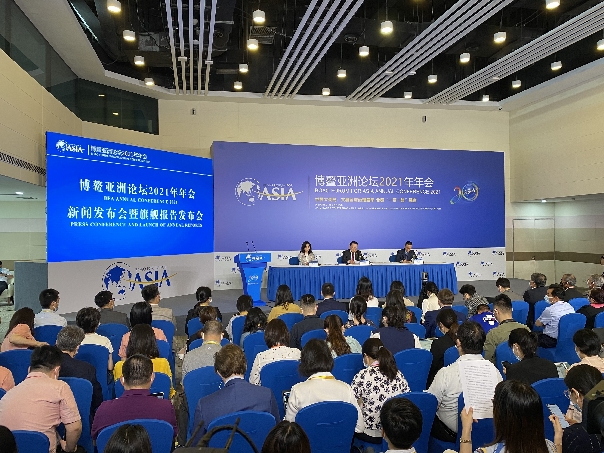Boao Annual Reports|“Sustainable Development: Asia and the World Annual Report 2021”:Asian governments should focus on four major deficits
Li Baodong (Secretary-General of Boao Forum for Asia) speaks at the First Press Conference and Flagship Report of the Boao Forum for Asia Annual Conference 2021(Photo by Wang Peiyao/Guangming Picture)
Boao Forum for Asia Annual Conference 2021 opens on April 18. The Conference held its first press conference and released two flagship reports, "Sustainable Asia and the World" and "Asian Economic outlook and Integration Progress".
The outbreak of COVID-19 has exposed the weaknesses in healthcare system and deficiency in key infrastructures, and underscored the importance of digital transformation and urgency of tackling climate change and environmental challenges. Through analysis of development situation in China, India, Indonesia, Japan, Kazakhstan,Republic of Korea,Malaysia,Pakistan, Qatar, Saudi Arabia,Singapore, Thailand,Vietnam, and other selected countries in Asia, this report finds out that healthcare,infrastructure,green transformation,and digital deficits are bottlenecking sustainable recovery in Asia. With limited fiscal and other resources,priorities shall be given by government on narrowing these four deficits with synergized efforts,thus releasing growth potential and helping realize multiple sustainable development goals.
According to the report,on healthcare deficit: Due to the lack of financial capacity or proper scheme,shortage of medical resources is a huge obstacle for many Asian economies,and to distribute vaccines with speed in such a populous continent is a daunting task. We should improve the access,fairness, and responsiveness of the health care system, invest more in public health infrastructures,strengthen the reserve dealing with public health emergencies,develop the health industry with opportunities for digital health, and improve micro-level governance.
On infrastructure deficit:Hard and soft infrastructure need to be more resilient to bolster economic activities and supply chains within the region. Develop more infrastructures targetingdealing with environmental risks and climate change,enhance investment in digital infrastructures.Further cross-border infrastructure connectivity and support innovative constructions.Build an equitable, fair, non-discriminative market environment,firmly implement free trade arrangement including the newly signed Regional Comprehensive Economic Partnership,seize the advantages of new technologies and business models like e-cc mmerce and automation.
On green deficit: With the rapid cconomic development,carbon dioxide emissions of Asian countries are growing. Many of them are facing severe environmental and climatic risks,along with challenges of adaptation and mitigation. Announcements made by leaders of China,Japan,Republic of Korea,and other Asian economies on carbon neutrality in 2020 are most welcome.Concrete blueprints are needed in industry transformation,technology advancement,and finance adaptation and mitigation. Governments should set proper incentive mechanisms to direct green transformation for various sectors, and decompose the mechanisms into local government level. Create more job opportunities related to the green economy, set out more ambitious Nationally Determined Contributions, and further support research and innovation regarding climate change.
On digital deficit: Digital inequality exists across the Asian economies, with the top digital companies highly concentrated geographically. How to narrow down the digital gap among Asian economies is one of the biggest challenges faced by Asia.
According to the report,to achieve the goal of "build back better" put forward by UN Secretary General António Guterres, the international society needs to hold firm in multilateralism, make concerted efforts to address the negative impacts brought by the COVID-19 pandemic, narrow the four development deficits, and tackle "global governance deficit". The world should prioritize vaccination, distribute vaccines equally, and establish mutual health data recognition arrangements, laying solid foundations for economic accelerated recovery. Push the implementation of the United Nations Framework Convention on Climate Change and Paris Agreement, facilitating the realization of Nationally Determined Contributions. Promote the connectivity and effectiveness of regional and international agreements and initiatives, including the Belt and Road Initiative. Advance the implementation of free trade agreements, and increase their standards gradually. Encourage cooperation in technology and innovation, promoting digital economy. Global governance platforms and international organizations will have a vital role to play.
Under the pandemic, Asian countries have, by all means, reinforced their health care system, stabilized the global supply chain, and led trade and investment recovery. Many regional initiatives were brought out to fight against the pandemic, enhance transportation connectivity, facilitate green transformation and shape up digital economy by the regional cooperation platforms, such as ASEAN+3, the Shanghai Cooperation Organization and the GCC, and international organizations including the ADB, AIIB, etc. Asia will be a major engine for global sustainable recovery. It is working hand in hand with other countries and regions to win the battle against the pandemic, trim development deficits, and promote economic integration. Asian countries must further strengthen their cooperation with other developing countries in experience sharing and capacity building. Asia is also going to play an active role in reshaping international rules and order, and promote construction of a community of shared future for mankind.
[ Editor: WPY ]





More From Guangming Online
Medics from Fujian leave for Shanghai to aid in battle against COVID-19 resurgence
New int'l land-sea transport service to Indo-China Peninsula launched
Another makeshift hospital under construction in Shanghai
Tourists view tulips in Suiping County, Henan
In pics: blooming gagea flowers on grassland in Zhaosu, Xinjiang
Greek workers stage 24-hour general strike over high prices